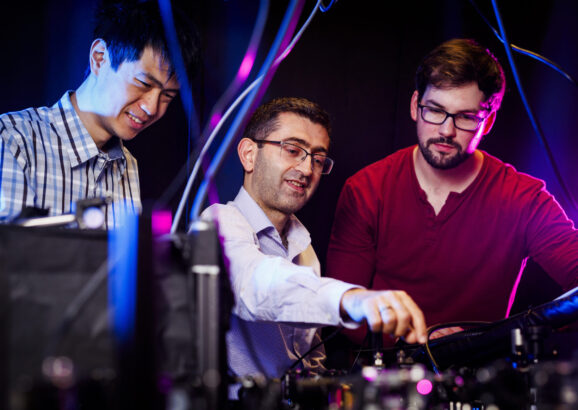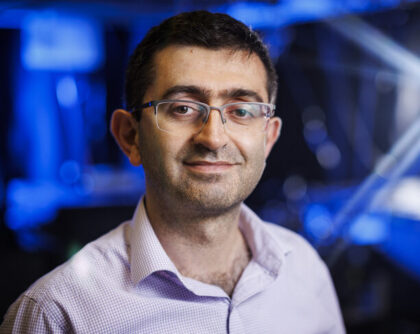Nuh Gedik
Research Interests
Professor Gedik’s research centers on investigating quantum materials by using advanced optical and electron based spectroscopies. Quantum materials are systems in which strong correlations lead to fascinating emergent phenomena such as high temperature superconductivity or colossal magnetoresistance. Despite intense research for decades, uncovering the physics of these materials with conventional techniques has been very difficult. This is mainly because of the fact that different degrees of freedoms (i.e. charge, spin and lattice) are strongly coupled in these systems and interplay between them is responsible for many of their exciting properties. Gedik group develops novel time-resolved techniques to selectively probe dynamics of charge, spin and lattice excitations with unprecedented time, momentum and energy resolutions. Material systems of interest include topological insulators, high temperature superconductors and atomically layered materials.
Biographical Sketch
Professor Gedik joined MIT Physics Department as an assistant professor in January 2008. He received his B.S. in Physics in 1998 from Bogazici University, Istanbul, Turkey and his Ph.D in Physics in 2004 from University of California, Berkeley. After his Ph.D, he moved to Caltech where he worked as a postdoctoral scholar till January 2008. His awards include National Science Foundation CAREER Award, Department of Energy Early Career Award, Sloan fellowship, DARPA Young Faculty Award and Moore Experimental Investigator award. He was promoted to Full Professor of Physics in 2018.

Physicists magnetize a material with light
The technique provides researchers with a powerful tool for controlling magnetism.
Awards & Honors
- 2024 // Ross Brown Investigator by the Brown Institute for Basic Sciences (Caltech) "to support the development of a new kind of microscopy that images electrons photo-emitted from a surface while also measuring their energy and momentum."
- 2023-25 // Committed to Caring honoree for 2023-25 (MIT)
- 2022 // American Physical Society (APS) Fellow "For the creation of time-resolved techniques to selectively probe dynamics of charge, spin and lattice excitations with unprecedented time, momentum and energy resolutions and for the observation of Floquet-Bloch states in a topological insulator material achieved with novel pump-probe methods."
- 2020-25 // Gordon and Betty Moore EPiQS Experimental Investigator Award "in support of experimental research aimed at achieving optical control of topological properties and ordered phases in quantum materials."
- 2020 // Ludwig-Genzel-Prize of the Physikalisches Institut, University of Stuttgart, Germany, "for pioneering the field of light-matter interactions in quantum materials using advanced optical and electron spectroscopy."
- 2019 // Miller Visiting Professorship, UC Berkeley
- 2015-20 // Gordon and Betty Moore Experimental Investigator in Quantum Materials "in support of leading-edge research to control the properties of quantum materials using light and to probe the time-dependent material states using photoemission spectroscopy and electron diffraction."
- 2013 // DARPA Young Faculty Award
- 2012-15 // Biedenharn Career Development Professorship
- 2012-14 // Sloan Research Fellowship
- 2011 // DOE Early Career Award
- 2009 // NSF CAREER Award
Key Publications
-
“Spontaneous gyrotropic electronic order in a transition-metal dichalcogenide” Su-Yang Xu*, Qiong Ma*, Yang Gao*, Anshul Kogar, Alfred Zong, Andres M. Mier Valdivia, Thao H. Dinh, Shin-Ming Huang, Bahadur Singh, Chuang-Han Hsu, Tay-Rong Chang, Jacob P. C. Ruff, Kenji Watanabe, Takashi Taniguchi, Hsin Lin, Goran Karapetrov, Di Xiao, Pablo Jarillo-Herrero, Nuh Gedik, Nature 578, 545-549 (2020)
-
“Light induced charge density wave in LaTe3” Anshul Kogar*, Alfred Zong*, Pavel E. Dolgirev, Xiaozhe Shen, Joshua Straquadine, Ya-Qing Bie, Xirui Wang, Timm Rohwer, I-Cheng Tung, Yafang Yang, Renkai Li, Jie Yang, Stephen Weathersby, Suji Park, Michael E. Kozina, Edbert J. Sie, Haidan Wen, Pablo Jarillo-Herrero, Ian R. Fisher, Xijie Wang, Nuh Gedik, Nature Physics 16, 159–163 (2020)
-
“Large, valley-exclusive Bloch-Siegert shift in monolayer WS2” Edbert J. Sie, Chun Hung Lui, Yi-Hsien Lee, Liang Fu, Jing Kong and Nuh Gedik, Science 355, 1066 (2017)
